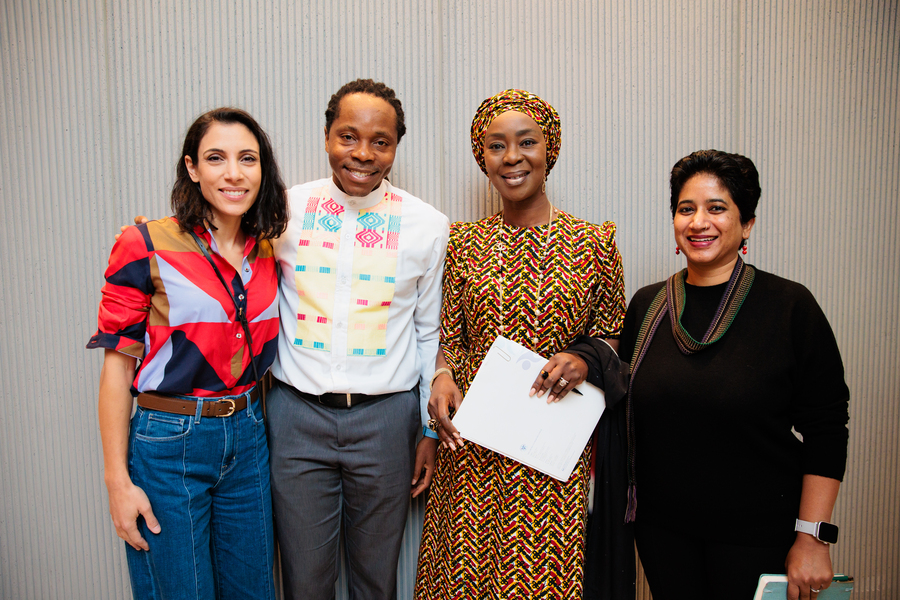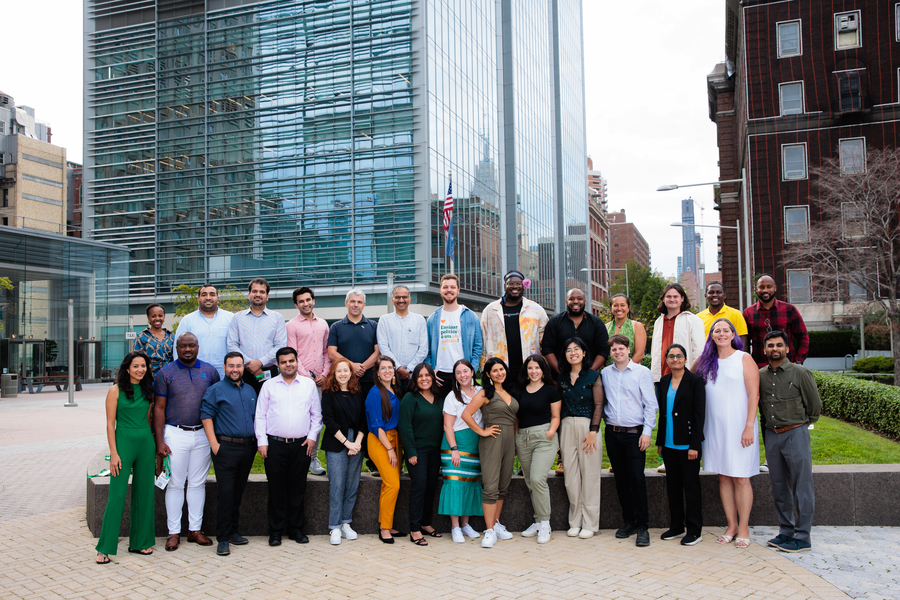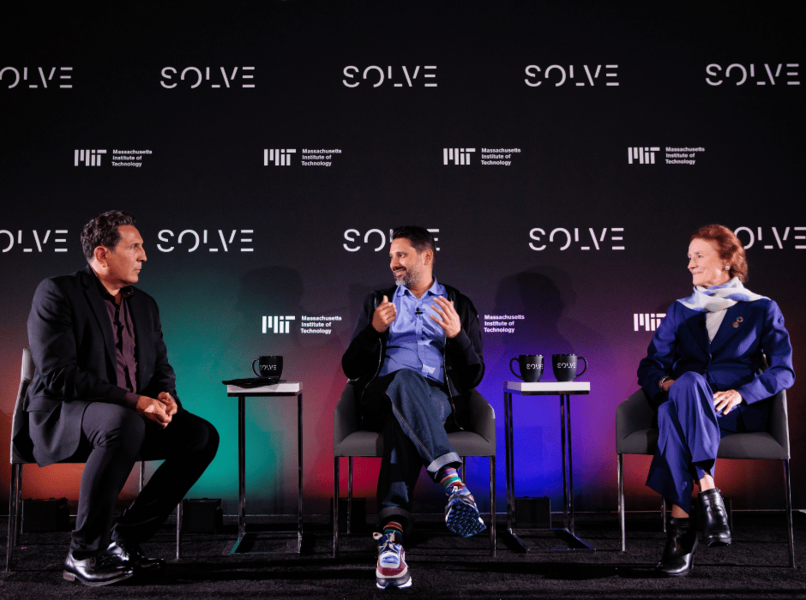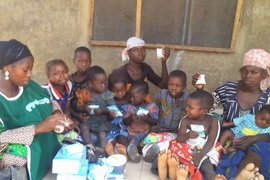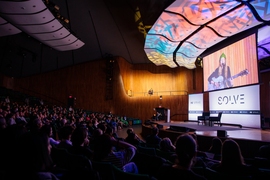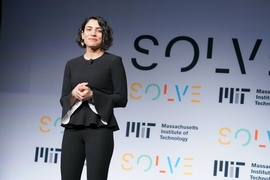In a celebratory convergence of innovation and global impact, the 2023 Solve Challenge Finals, hosted by MIT Solve, unfolded to welcome the 2023 Solver Class. These teams, resolute in their commitment to addressing Solve’s 2023 Global Challenges and rooted in advancing the United Nation’s Sustainable Development Goals, serve as the perfect examples of the impact technology can have when addressed toward social good.
To set the tone of the day, Cynthia Barnhart, MIT provost, called for bold action in service to the world, and Hala Hanna, MIT Solve executive director, urged the new Solver teams and attendees to harness the power of technology for benevolent purposes. “Humans have lived with the dichotomy of technology since the dawn of time. Today we find ourselves at another juncture with generative AI, and we have choices to make. So, what if we choose that every line of code heals, and every algorithm uplifts, and every device includes?” she said during the opening plenary, Tech-Powered and Locally-Led: Solutions for Global Progress.
Global, intergenerational, and contextual change for good
This year's Solve Challenge Finals served as a global platform for reflection. Majid Al Suwaidi, director-general of COP28, shared the experiences that have shaped his approach to climate negotiation. He recounted a poignant visit to a United Nations High Commissioner for Refugees-facilitated refugee camp housing 300,000 climate migrants. There he met a mother and her nine children. In a sprawling camp housing 300,000 people, scarcity was evident, with just one toilet for every 100 residents. "There are people who contribute nothing to the problem but are impacted the most," Majid emphasized, stressing the need to prioritize those most affected by climate change when crafting solutions.
Moderator Lysa John, secretary-general of CIVICUS, steered the conversation toward Africa's growing influence during her fireside chat with David Sengeh SM ’12, PhD ’16, chief minister of Sierra Leone, and Toyin Saraki, president of the Wellbeing Foundation. The African Union was recently named a permanent member of the G20. Saraki passionately advocated for Africa to assert itself: “I would like this to be more than just the North recognizing the South. This is the time now for us to bring African intelligence to the forefront. We have to bring our own people, our own data, our own resources.” She also called for an intergenerational shift, recognizing the readiness of the younger generation to lead.
Sengeh, who is 36 himself, emphasized that young people are natural leaders, especially in a nation where 70 percent of the population is youth. He challenged the status quo, urging society to entrust leadership roles to the younger generation.
Saraki praised Solve as a vital incubation hub, satisfying the need for contextual innovation while contributing to global progress. She views Solve as a marketplace of solutions to systemic weaknesses, drawing upon the diverse approaches of innovators both young and old. "That is the generation of intelligence that needs to grow, not just in Africa. Solve is amazing for that, it's an investor's delight," she said.
Henrietta Fore, managing partner, chair, and CEO of Radiate Capital, Holsman International, shared an example of entrepreneurship catalyzed by country-level leaders, referencing India's Swachh Bharat program aimed at promoting cleaner environments. The government initiative led to a burst of entrepreneurial activity, with women opening various shops for toilets and bathroom commodities. Fore highlighted the potential for companies to collaborate with countries on such programs, creating momentum and innovation.
Trust as capital
Trust was a prevalent theme throughout the event, from personal to business levels.
Johanna Mair, academic editor of the Stanford Social Innovation Review, asked Sarah Chandler, vice president of environment and supply chain innovation at Apple, for advice she may have for corporations and startups thinking about their holistic climate goals. Chandler emphasized the importance of trust that businesses must have that environmental goals can align with business goals, highlighting Apple's 45 percent reduction in carbon footprint since 2015 and 65 percent revenue increase.
Neela Montgomery, board partner at Greycroft, discussed her initial skepticism around collaborating with large entities, seeking advice from Ilan Goldfajn, president of the Inter-American Development Bank. “Don’t be shy to come … take advantage of a multilateral bank … think about multilateral organizations as the ones to make connections. We can be your support commercially and financially, we could be your clients, and we could be your promoters,” said Goldfajn.
During a fireside chat among Janti Soeripto, president and CEO of Save the Children USA, and Imran Ahmed, founder and CEO of Center for Countering Digital, Soeripto shared her belief that the most effective change comes from the country and local community level. She pointed to a contextual example of this where Save the Children invested in scaling a small Austrian ed-tech startup — Library for All. The partnership positively impacted literacy for other communities around the world by making literature more accessible.
There still exist major hurdles for small enterprises to enter the global market. Imran points to sclerosis and hesitancy to trust small-scale innovation as a roadblock to meaningful change.
The final discussion of the closing plenary, Funding the Future: Scaling up Inclusive Impact, featured Fore; Mohammed Nanabhay, managing partner of Mozilla Ventures; and Alfred Ironside, vice president of communications at MIT, who asked the two panelists, “What do you [look for] when thinking about putting money into leaders and organizations who are on this mission to create impact and achieve scale?”
Beyond aligning principles with organizations, Nanabhay said that he looks for tenacity and, most importantly, trust in oneself. “Entrepreneurship is a long journey, it’s a hard journey — whether you’re on the for-profit side or the nonprofit side. It’s easy to say people should have grit, everyone says this. When the time comes and you’re struggling … you need to have the fundamental belief that what you’re working on is meaningful and that it’s going to make the world better.”
